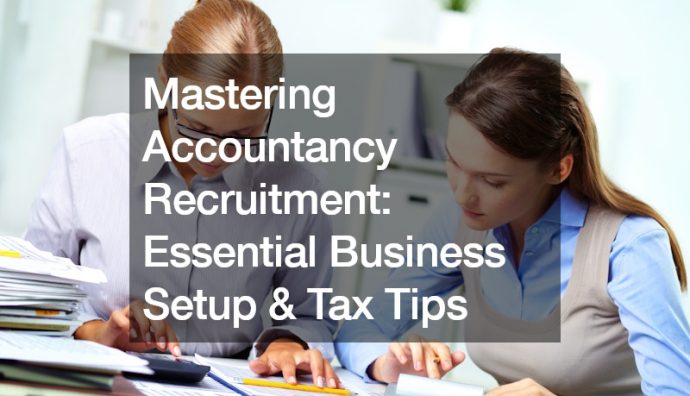
Accountancy recruitment is a dynamic field that demands careful consideration of both business setup and tax obligations. Whether you’re a seasoned recruiter or considering venturing into this industry, understanding the nuances of structuring your business and managing tax responsibilities is crucial for success.
Choosing the Right Business Structure
One of the first decisions you’ll face when setting up your accountancy recruitment business is choosing the appropriate business structure. Options include operating as a sole trader, establishing a company, or setting up a trust. Each structure has its pros and cons, and the choice depends on factors such as tax implications, asset protection, and administrative requirements.
- Sole Trader: Operating as a sole trader is the simplest and most cost-effective option. However, it may not be ideal for high-income earners due to individual tax rates.
- Company: Setting up a company offers better asset protection and may result in lower taxes, as companies are taxed at a flat rate. However, it comes with increased administrative responsibilities.
- Trust: While trusts offer benefits like tax distribution flexibility and asset protection, they require careful consideration of eligibility criteria and may not be suitable for all situations.
Navigating Tax Obligations
Understanding and managing tax obligations is essential for accountancy recruitment businesses to remain compliant and financially stable. Key taxes and compliance requirements include income tax, Goods and Services Tax (GST), Fringe Benefits Tax (FBT), and Pay As You Go (PAYG) withholding.
- GST Registration: Businesses with a GST turnover exceeding $75,000 must register for GST and include 10% GST on their services. GST is reported to the Australian Taxation Office (ATO) through Business Activity Statements (BAS), typically lodged quarterly.
- Fringe Benefits Tax: Employers providing fringe benefits to employees are subject to FBT, which is payable at a rate of 47%. Common fringe benefits include company car usage and non-business accommodation.
- PAYG Withholding: Employers are required to withhold tax from employees’ wages and salaries and remit it to the ATO. This is known as PAYG withholding and is reported through BAS.
Payroll and Superannuation Responsibilities
Managing payroll and superannuation obligations is essential for accountancy recruitment businesses to meet legal requirements and ensure employee financial security. Employers must calculate and pay superannuation contributions for eligible employees, currently set at 10% of ordinary earnings.
- Superannuation Guarantee Scheme: Under this scheme, most employees are entitled to compulsory super contributions, which employers must pay at least quarterly. It’s advisable to pay super contributions monthly to avoid oversight.
- Single Touch Payroll (STP): Employers must submit payroll information, including wages, taxes, and super contributions, to the ATO through STP. This ensures accurate reporting and compliance with tax laws.
Maximizing Tax Deductions
Tax deductions play a significant role in minimizing tax liabilities for accountancy recruitment businesses. Common deductions include expenses related to business travel, home office usage, professional fees, and association fees.
- Home Office Expenses: With the rise of remote work, many recruiters can claim deductions for home office expenses, such as utilities, internet, and depreciation on office equipment.
Bonus Tips for Success
In addition to the essential business setup and tax tips, recruiters can leverage additional strategies to enhance their success in the competitive accountancy recruitment industry.
- Referral Partnerships: Establishing partnerships with referral sources can be valuable for sourcing candidates and clients. Consider offering incentives such as gift cards to incentivize referrals while remaining tax-deductible.
- Financial Planning: Set aside a portion of profits for taxes and other financial obligations to avoid unexpected expenses. Consult with financial experts to develop a sound financial strategy tailored to your business needs.
- Legal Protection: Ensure your business is adequately protected legally by working with lawyers, insurance brokers, and financiers. Proper legal guidance can mitigate risks associated with employment disputes, client conflicts, and other potential issues.
Mastering accountancy recruitment requires a comprehensive understanding of business setup, tax obligations, and strategic planning. By implementing these essential tips and leveraging industry best practices, recruiters can build a successful and sustainable recruitment business in the competitive market.
.

